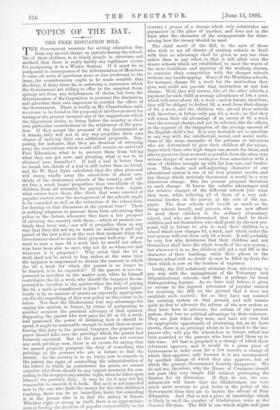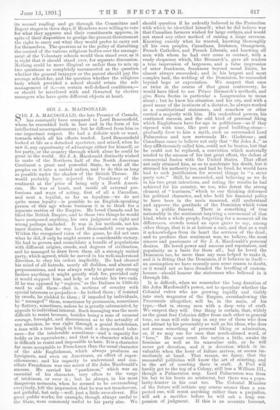TOPICS OF THE DAY.
• THE FREE EDUCATION BILL. THE Government measure for setting education free from any special charge on parents during the school- life of their children, is so wisely simple in structure and method, that there is really hardly any legitimate excuse for postponing it to a Winter Session. If it must be so postponed in consequence of the determination of Members to raise all sorts of questions more or less irrelevant to the issue, the constituencies ought to be made sensible that the delay, if delay there be, in enforcing a concession which the Government are willing to offer in the simplest form, springs not from any helplessness of theirs, but from the determination of the Opposition to protract the discussion, and advertise their own eagerness to overbid the offers of the Government. There is really, as Mr. Chamberlain said, no excuse to be found in the proposal of the Government for raising at the present moment any of the suggestions which the Opposition desire to bring before the country as their own particular contributions to the settlement of the ques- tion. If they accept the proposal of the Government as it stands, they will not in any way prejudice their own chance of carrying their own additional proposals. Sup- posing, for instance, that they are desirous of sweeping away the restrictions which would still remain on universal Free Education, what is to prevent them from taking what they can get now, and granting what is not to be obtained now, hereafter ? If half a loaf is better than no bread, two-thirds of a loaf is still better than no bread, and Sir W. Hart Dyke calculates that the plan proposed will sweep wholly away the school-fees of about two- thirds of the elementary schools of the country, and will set free a much larger proportion than two-thirds of the children from all necessity for paying these fees. Again, what excuse have those who think that some amount of popular control over the management of the schools ought to be conceded as well as the extinction of the school-fees, for forcing on that discussion at the present time ? There is nothing whatever to prevent them from advocating that policy in the future, whenever they have a fair prospect of carrying the country with them,—which at present cer- tainly they have not,—nor will it prejudice them in any way that they did not try to insist on making it part and parcel of the new policy at the very first moment when the Government chose to meet their proposal half-way. If you want to save a man 3d. a week that he would not other- wise have been able to save, why not do so whenever and wherever it is proposed ? Why insist that the 3d. a week shall not be saved to him unless at the same time the taxpayer is empowered to dictate the manner in which the 3d. a week for which the parent is no longer to be dunned, is to be expended ? If the parent is not em- powered to interfere in the matter now, when he himself contributes the 3d. a week, why should the taxpayer be em- powered to interfere in the matter when the duty of paying the 3d. a week is transferred to him ? The present oppor- tunity is by no manner of means an especially appropriate one for the engrafting of this new policy on the course to be taken. Nor does the Gladstonian lose any advantage for urging his opinion in future, by virtue of postponing to another occasion the practical advocacy of that opinion. Supposing the parent who now pays his 2d. or 3d. a week, had possessed the power of dictating bow it should be spent, it might be reasonable enough to insist that on trans- ferring this duty to the general taxpayer, the general tax- payer should take over the privilege which the parent had formerly exercised. But as the parent does not exercise any such privilege now, there is no excuse for saying that we cannot properly postpone the duty of conceding this privilege to the persons who are in future to find the money. As the country is in no hurry now to concede to the parent the right of .controlling the administration of the school to which he contributes his quota, we cannot conceive why there should be any urgent necessity for con- ceding to the taxpayer any similar right, when he takes upon himself the parent's duty. It may be (or it may not be) reasonable to concede it to both. But as it is not conceded now to the one who finds the money for his own children's teaching, there can be no immediate hurry for conceding it to the person who is to find the money in future. Whether right or wrong in itself, there is no appropriate- ness in forcing the doctrine of popular responsibility on the country a propos of a change which only substitutes one paymaster in the place of another, and does not in the least alter the character of the arrangements for deter- mining how the money should be used.
The chief merit of the Bill, in the eyes of those who wish to see all classes of existing schools so dealt with that no advantage shall be given to any one class rather than to any other, is, that it will allow even the dearer schools which are established to meet the wants of the more fastidious and aspiring of the working classes, to continue their competition with the cheaper schools without any handicapping. Many of the Wesleyan schools, for instance, charge 9d. a week for the instruction they give, and could not provide that instruction at any less charge. Well, they will receive, like all the other schools, a payment for each child in average attendance of 10s. a year, which will cover about 3d. a week ; and in future, therefore, they will be obliged to deduct 3d. a week from their charge of 9d. a week, and the children who attend these schools will, therefore, in future only pay 6d. a week ; so that they will retain their old advantage of an excess of 6d. a week over the average charge, and yet be relieved, like the others, at the expense of the taxpayers, of the average amount of the English child's fee. It is very desirable not to interfere in any way with the intellectual, moral, and social ambi- tions of the more energetic of the artisans or labourers who are determined to give their children all the 'advan- tages which their own high wages can secure for them, and also to preserve them as much as possible from the often very serious danger of moral contagion from association with a class of children brought up with far Jess care and tender- ness. This elastic and self-adjusting character of our educational system is one of its very greatest merits, and any change which seriously threatened it would be a very disastrous change. But the present proposal threatens no such change. It leaves the relative advantages and the relative charges of the different schools just what they were, while relieving all of them of a very sub- stantial burden on the parent at the cost of the tax- payer. The dear schools will benefit as much as the cheap schools benefit, and parents who can now afford to send their children to the ordinary elementary school, and who are determined that it shall be their children and not themselves who shall profit by the new pro- posal, will in future be able to send their children to a school which now charges fid. a week, and which under the new system will cost them only 3d. a week. It will probably be very few who determine that their children and not themselves shall have the whole benefit of the new system ; but wherever it is so, the children will get a real lift in the character of their teaching, while their places in the cheaper school will no doubt at once be filled up from the class which is now on the borders of vagrancy.
Lastly, the Bill sedulously abstains from interfering in any way with the management of the Voluntary and Denominational schools, and this is perhaps its most distinguishing feature. As we have said before, it gives no excuse to the bigoted advocates of popular control for resisting the Bill on the ground that it does not establish such control ; for as they have not resisted the existing system on that ground, and will remain quite as free to advocate the reform of the new system as they have been to advocate the reform of the present system, they lose no political advantage by their reticence. They are just where they were, and have not even lost an appropriate opportunity of protesting, for, as we have shown, there is no privilege about to be denied to the tax- payers who will pay the school-fees in future, which has been accorded to the parents who have paid them up to this time. All that is proposed is a change of which these reformers approve, and it would be a gross piece of factiousness to defer even for a few months a change of which they approve, only because it is not accompanied by another change of which they also approve, but of which the present Government heartily disapprove. We do not see, therefore, why the ,House of Commons should not pass this very simple Bill without prolonging the Session for its discussion. If they do not, the con- stituencies will know that the Gladstonians are very much more anxious to pick holes in the policy of the Government than they are to hasten the advent of Free Education. And that is not a piece of knowledge which is likely to swell the number of 0-1a,dstonia.n votes at the General Election. The Bill is one which might well pass its second reading and go through the Committee and Report stages in three days, if Members were willing to vote for what they approve and their constituents approve, in spite of their disposition to grudge the present Government the right to carry out what they would prefer to carry out for themselves. The question as to the policy of disturbing the control of the various religious bodies over the manage- ment of the Voluntary schools would then stand over, as it is right that it should stand over, for separate discussion. Nothing could be more illogical or unfair than to mix up two questions so completely unconnected as the question whether the general taxpayer or the parent should pay the average school-fee, and the question whether the religious body which provided a school should retain the sole management of it,—on certain well-defined conditions,— or should be interfered with and thwarted by elective managers who have quite different objects at heart.



































 Previous page
Previous page